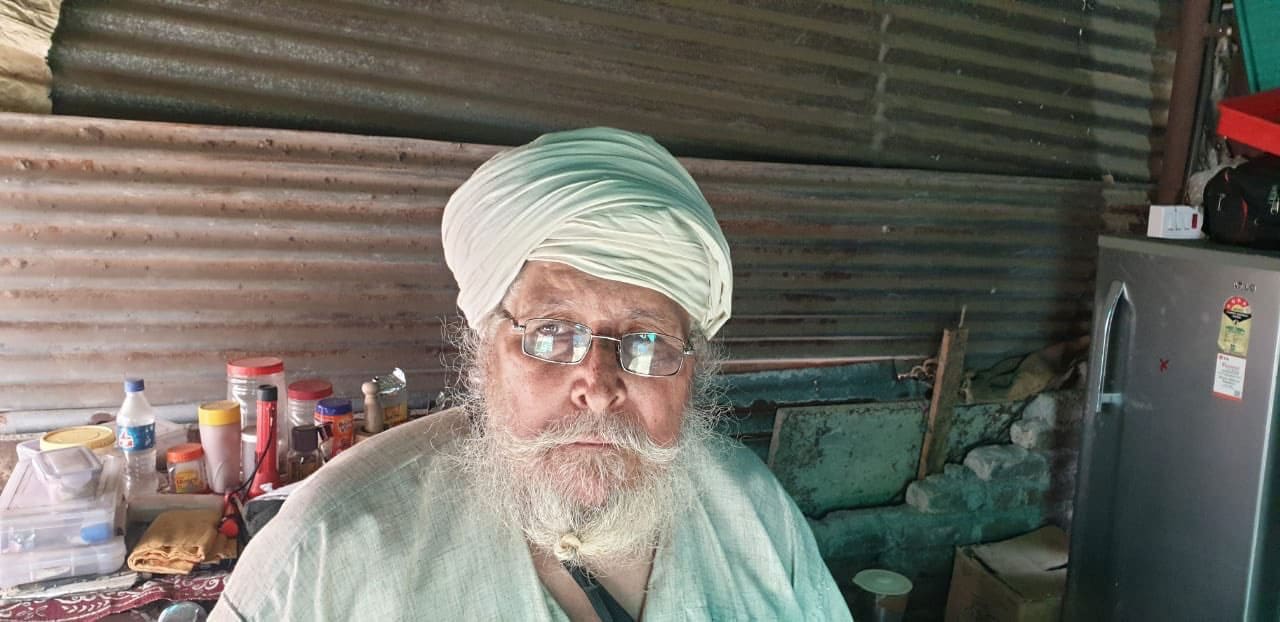The images of thousands of migrants walking on foot for miles desperate to reach their homes are not uncommon during the months-long lockdown amid the pandemic situation. While commuting the long distances many of the commuters have starved and faced miserable conditions across Indian highways.
This 81-year-old Khaira Babaji run ‘Guru ka langar’, near Karanji on Maharashtra’s National Highway-7 turned out to be a boon to many of such migrants. The langar is sited about 11 km away from Gurudwara Bhagod Sahib, Wai, which holds significant historical importance. Guru Gobind Singh, the 10th Sikh Guru, stayed there in 1705.
It is for at least some of these commuters, the 81-year-old Khaira Babaji run ‘Guru ka langar’, near Karanji on Maharashtra’s National Highway-7 turned out to be a boon. The langar is sited about 11 km away from Gurudwara Bhagod Sahib, Wai, which holds significant historical importance. Guru Gobind Singh, the 10th Sikh Guru, stayed there in 1705.

“Since the Gurudwara Bhagod Sahib is away from the main road, in 1988 (32 years ago), this free ‘langar’ came up here as its branch. I was assigned to manage it with the blessings and guidance of Nanded Gurudwara Sahib’s Baba Narinder Singhji and Baba Balwinder Singhji,” said Khaira.
For the last 10 weeks coinciding the lockdown, Baba Karnail Singh Khaira has been serving free meals and has fed at least 20 lakh people of which at least 5 lakhs may have taken away parcels. The estimation is based on the number of disposable plates used to feed the people. Though ‘Guru ka langar’ has been feeding people for years, the scales of its services have reached a magnitude owing to thousands of stranded migrants, hungry commuters, truckers, and poor villagers resorting to it for feeding themselves.
The langar constitutes a minimalistic ramshackle tin shed covered with plastic sheets and is the sole venue with food availability for over a stretch of 450 km.
“This is a remote, tribal region. Behind us for nearly 150-km, and ahead for nearly 300 km, there’s not a single dhaba or restaurant… So most people prefer to halt at ‘Guru ka langar’ and avail of our round-the-clock services,” he told IANS.
The Langar Service
The langar serves tea along with bread toast/biscuits for breakfast and plain rice, tur dal, and curry for meals. Soap and borewell water are also kept alongside as bathing facilities for the langar visitors.
Additionally, the langar distributes daily chapati-jaggery to feed around 250 stray animals including dogs, cats, and cattle that roam nearby and have faced the brunt of the lockdown.
Though the langar keeps two donation boxes outdoor for accepting people’s offerings within their capacities, it is neither mandatory nor accounted for. The money received in the donation box is put back into the services of the langar’.
Managing the langar and ensuring daily meals to people have not been an easy task. Khaira explains, “We had hordes of people coming days and we kept continuously cooking food for them… We welcomed all with smiles and folded hands, irrespective of caste, religion… My regular team of 17 ‘sevaks’, including 11 cooks and other helpers were overworked but ensured a non-stop supply of fresh, piping hot food”.
To meet the requirements for its smooth running, Khaira has accepted contributions made by his youngest brother Baba Gurbax Singh Khaira. His brother, 67, settled in the USA, has also fundraised among the American Sikh community for the cause in addition to donating himself.
Life of Khaira Baba
Born in Meerut, UP, Khaira had left home at the age of 11 and thereafter, devoted himself at the service of humankind.
“As a kid, I helped build a bridge on River Godavari…” he said. Consequently, he dedicated his life to organizing langars for several Gurudwaras in the Middle East and Europe. Though he never received a formal education, by the virtue of spending substantial years of his life abroad, he has mustered seven languages including English, Dutch, German and Arabic alongside Indian languages like Hindi, Marathi, and Punjabi.
“It’s the ”marzi” (will) of Wahe Guru… We are only his instruments in the service to humanity. See, three vehicles are donated by devotees to this ”langar”…but my only belongings on earth are the three sets of clothes, I live and sleep here, eat the same food served to the people”, he politely adds, when asked about the motivation behind his deeds.
In today’s world, the acts of selflessness are few and far between. Amidst one of the gravest crises situations the country is dealing with, in the face of the Corona pandemic, Baba Karnail Singh Khaira’s relentless act of selflessness is both inspiring and monumental. Especially, the non-discriminatory nature of the service creates an example for the country, often rifted due to communal, caste, and class polarisations.
If an individual can rise above the ‘self’ for serving humanity, where do we stand both as individuals and the citizens of India?

